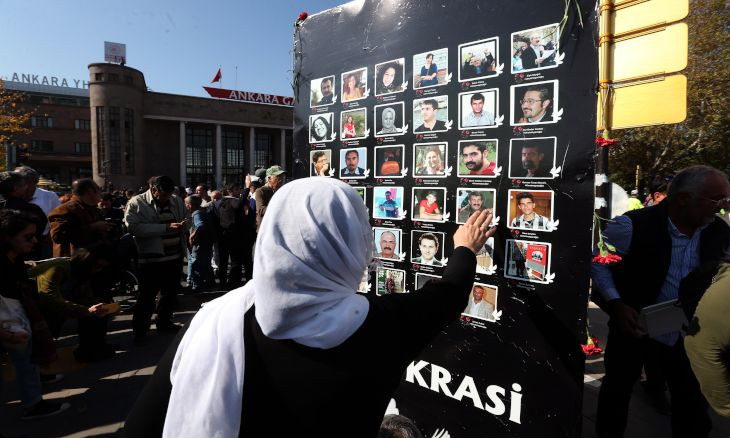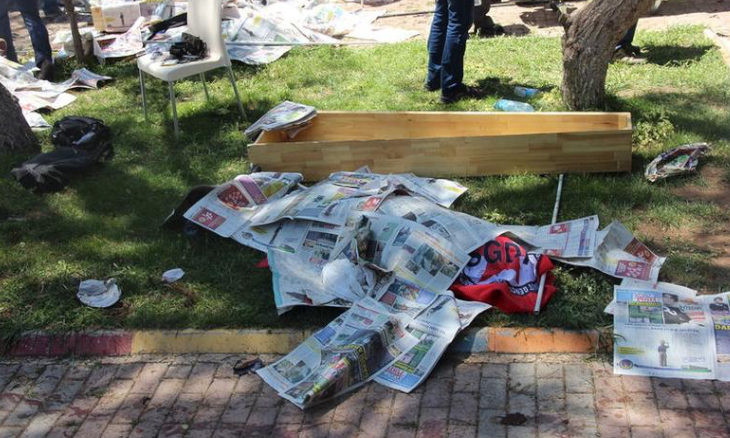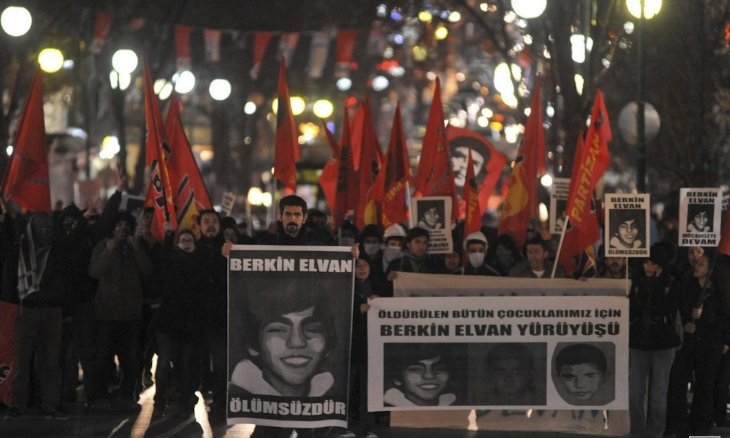Critical trials in Turkey to resume after pandemic lockdowns
Hearings in the trials for suspects in two 2015 bomb attacks and two deadly train accidents in 2018 are slated to resume after a three-month suspension in judicial activity that was imposed in Turkey amid measures taken against the COVID-19 pandemic.
Serkan Alan / DUVAR
 The Ankara massacre four years on: as the legal battles continue, so does the pain
The Ankara massacre four years on: as the legal battles continue, so does the painHearings in the trials for suspects in two 2015 bomb attacks and two deadly train accidents in 2018 are slated to resume after a three-month suspension in judicial activity that was imposed in Turkey amid measures taken against the COVID-19 pandemic.
The trial in a train derailment that occurred in the Northwestern province of Tekirdağ in July 2018, killing 25 and injuring over 300, is scheduled to resume on June 25. Four employees of the Turkish State Railways (TCDD) are being tried for involuntary manslaughter.
The fourth hearing in a trial pertaining to an Ankara train wreck that killed nine people and injured more than 80 in December 2018 is slated for July 17. A high-speed train collided with a locomotive at a station near the capital. A total of ten suspects, including a number of TCDD personnel, are being tried for their role in the circumstances that led to the collision.
Meanwhile, hearings in the trial concerning the October 2018 Ankara suicide bomb attack will resume on July 17. The bombing, which was carried out by members of a Turkish ISIS cell near the Ankara train station and that targeted a leftist rally, killed 103 people and went down as the worst terror attack in the history of the Turkish republic. Only one suspect, Erman Ekici, is currently behind bars while the remaining sixteen are fugitives.
“Searching for justice in this country is already very difficult, it's practically impossible. These social cause trials are carried out via public pressure. The pandemic has also been a major problem for the justice process, which is moving at a snail's pace. The fugitive suspects are to be tried and these are very dangerous ISIS members. These are people that could have been caught and held but were released,” said İlke Işık of the October 10th Trial Lawyer's Commission.
 Surveillance footage of Suruç massacre believed to have been erased or concealed
Surveillance footage of Suruç massacre believed to have been erased or concealedOn Aug. 18, the hearing in the trial of a July 2015 suicide bomb attack in the southeastern border town of Suruç is scheduled to take place. That attack killed 33 leftists who were planning to travel to the Syrian city of Kobane, which had been liberated from ISIS control by Kurdish forces earlier that year. Yakup Şahin, a Turkish ISIS member who is currently behind bars on a life sentence over his role in the Ankara bombing, is the only living suspect in the attack. The last hearing was held in spite of the pandemic on May 20, though lawyers for the plaintiff were not allowed in the courtroom.
Seven years after the fact, the trial is still ongoing in the killing of Berkin Elvan, a teenager who was hit in the head by a tear gas canister fired by police during the Gezi Park protests in June 2013. Elvan succumbed to his injuries the next year at the age of fifteen, after spending months in a coma. Police officer Fatih Dalgalı is charged with probable intent to kill over his role in the death of Elvan, who became a symbol of the Gezi Park protests. The 18th hearing in the trial is scheduled for Sept. 23.
 Gendarmerie report says Gezi protest victim Berkin Elvan 'partly to blame' for his own death
Gendarmerie report says Gezi protest victim Berkin Elvan 'partly to blame' for his own death
